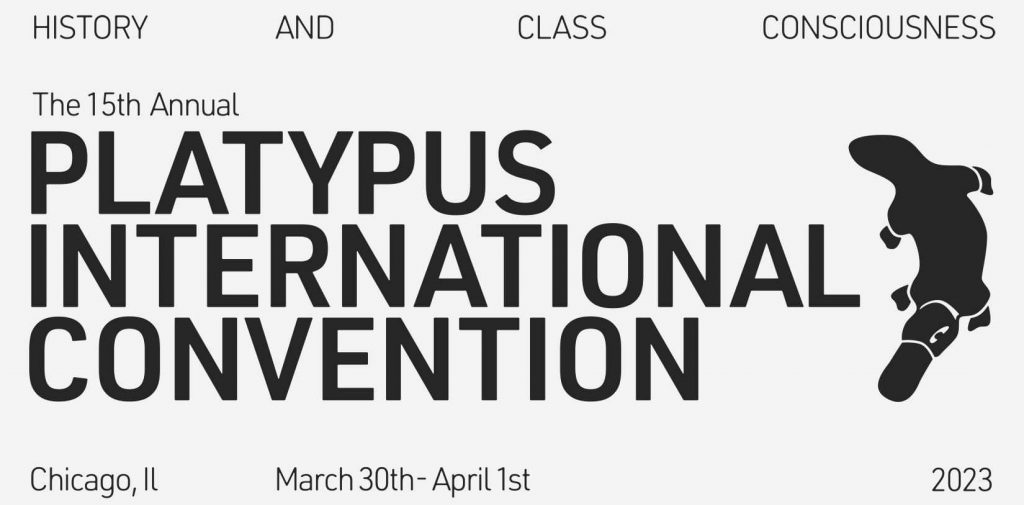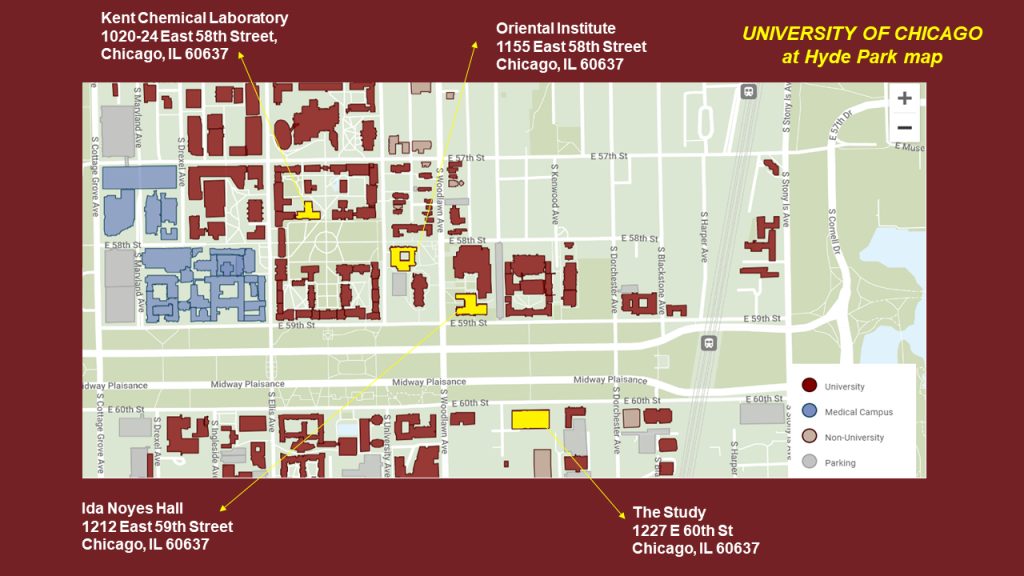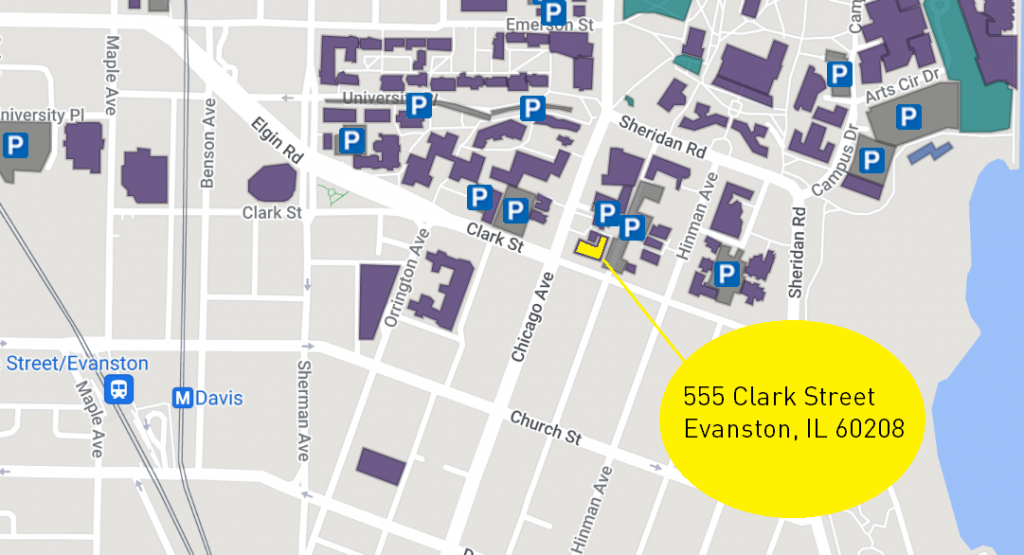15th Annual Platypus International Convention 2023: History and Class Consciousness

Wednesday March 29 – Northwestern University
4:30 - 6:00pm (555 Clark Street | Room B03): Marxism and Radical Republicanism
Speaker: Luke Pickrell (Marxist Unity Group)
Respondent: Benjamin Katz
(Read More)
6:30 - 9:00pm: Social Event with food & beverages (paid à la carte)
Five & Dime 1026 Davis St, Evanston, IL 60201
Thursday March 30 – University of Chicago
9:30 - 11:00am (Ida Noyes Hall | Max Palevsky Theater): Reform and Revolution: A presentation by Johannes Regell (Socialisterna – Välfärdspartiet)
Speaker: Johannes Regell (Socialisterna Välfärdspartiet)
Respondent: Andreas Wintersperger
(Read More)
11:00am - 12:00 pm: Lunch Break
12:00 - 2:00pm (Ida Noyes Hall | Max Palevsky Theater): Second International Marxism in America: Origins and Crisis
Speakers: Chris Cutrone, Ed Remus, Will Stratford, Spencer Leonard, Pamela C. Nogales C.
Respondent: David Faes
(Read More)
This panel will explore foundational questions about the origins and crisis of the Debs-era SPA. How did the SPA inherit various forms of nineteenth-century revolutionary politics, including Jeffersonianism, Civil War-era republicanism, and the Marxism of the First International? How did the success of the SPA’s organizers and officeholders prompt crises within the party, including conflicts over the party’s relationship to labor unions and to the U.S. state, and how did SPA leaders such as Eugene Debs and Victor Berger approach these crises and conflicts? Finally: was the viability of the Debs-era SPA conditioned upon a specific form of capitalism that will never return, or does the political and societal terrain of capitalism remain in some ways unchanged from Debs’s time to ours, such that the horizons of the SPA remain our own?
3:00 - 4:30pm (Kent Lab | Room 120): Broadcasting & Publishing in Platypus
Speakers: Spencer Leonard, Louis Sterrett, Pamela C. Nogales C.
Respondent: Andreas Wintersperger
(Read More)
5:00 - 6:30pm (Kent Lab | Room 120): The low point of labor resistance is behind us: The Socialist Workers Party looks forward
Speaker: Roy Landersen (Socialist Workers Party)
Respondent: Aaron Bao
(Read More)
8:00 – 11:00pm (Tritriangle Art Gallery | Floor 3): Night of the Avant Garde ft. live music | Program ($10 suggested donation at door)
Friday March 31 – University of Chicago
11:45 - 1:45pm (The Study at University of Chicago | Winter Garden): Whither Maoism?
Speakers: Norman Finkelstein (author), CJ Hunt (UC Santa Cruz), Jerry Harris (Global Studies Association of North America), Mike Macnair (Communist Party of Great Britain)
Respondent: Spencer Leonard
(Read More)
What has Maoism been, and where is it going? How does its history weigh on us today — and why should we care about it?
3:30 - 5:00 pm (The Oriental Institute | James Henry Breasted Hall): Andrew Feenberg on The Ruthless Critique of Everything Existing
Speaker: Dr. Andrew Feenberg (Simon Fraser University)
Respondents: Ethan Linehan, Itsï Ramirez
(Read More)
3:00 - 4:30pm (Kent Lab | Room 120): Norman Finkelstein on I'll Burn That Bridge When I Get to It
Speaker: Dr. Norman Finkelstein
Respondent: Edward Remus
(Read More)
5:00 - 6:30pm (Kent Lab | Room 120): Revolutionary Strategy & Neo-Social Democracy: A Trans-Atlantic Dialogue
Speakers: Mike Macnair (Communist Party of Great Britain), Matthew Strupp (Marxist Unity Group)
Respondent: David Mountain
(Read More)
8:00 - 10:00pm: Social Event with food and beverages ($40 paid in advance here: Paypal)
Exchequer Restaurant, 226 S Wabash Ave, Chicago, IL 60604
Saturday April 1 – University of Chicago
9:00 – 11:00am (Kent Lab | Room 120): The Politics of Critical Theory
Speakers: Mike Atkinson (University of Brighton), Nora Sprenger (University of Vienna), Ryan Mickler (Northeastern University), Miles Byrne (University of California, Santa Cruz), Bret Schneider (Caesura Magazine)
Respondent: Suzy Vogenthaler
(Read More)
9:00 – 11:00am (Ida Noyes Hall | Max Palevsky Theater): Immigration and the Left
Speakers: Jule Hoffman (University of Leipzig), Tobias Kohlberger (University of Applied Sciences, BFI Vienna), Jakob Trescher (University of Leipzig), Leo Jank (University of Vienna), Barbara Utracka (Oxford University)
Respondent: Caleb Chen
(Read More)
9:00 – 11:00am (Ida Noyes Hall | 2nd Floor, West Lounge): What Does Climate Change?
Speakers: Jonas Nestroy (Free University of Berlin), Allison Hewitt-Ward (School of Visual Arts), Noah Sonnenschein (University of Magdeburg), Michael McClelland (University of Otago)
Respondent: Andony Melathopoulos
(Read More)
11:00am - 12:00pm: Lunch Break
12:00 - 2:00pm (Kent Lab | Room 120): Back to the 1970s? Socialism, Labor, and the Left
Speakers: Luke Pickrell (Marxist Unity Group), Naomi Craine (Socialist Workers Party), Richard de Vries (Teamsters), Jack Metzgar (Roosevelt University)
Respondent: C.D. Hardy
(Read More)
2:30 - 4:30pm (Kent Lab | Room 107): The Politics of the Democratic Socialists of America
Speakers: Harold Meyerson (Democratic Socialist Organizing Committee; DSA), Jamal Abed-Rabbo (Class Unity), Matthew Strupp (Marxist Unity Group), D. L. Jacobs (Platypus Affiliated Society)
Respondent: Erin Hagood
(Read More)
5:00 - 7:00pm (Kent Lab | Room 107): A Century of Critical Theory: The Legacy of Georg Lukács
Speakers: Mike Macnair (Communist Party of Great Britain), Andrew Feenberg (Simon Fraser University), Chris Cutrone (Platypus Affiliated Society)
Moderator: Atiya Singh
(Read More)
9:00pm - 12:00am (NOT NOT in Humboldt Park, 3950 W Grand Ave, Chicago, IL 60651): Social Event ft. live music



